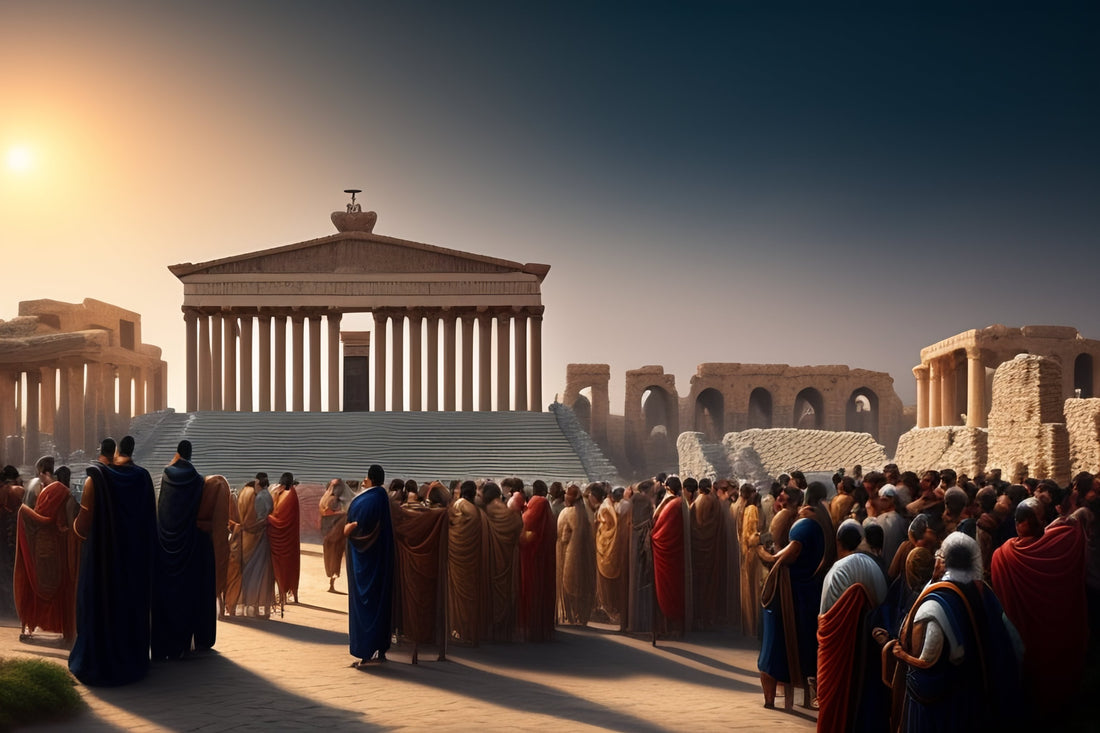Have you ever wondered what the differences were between Greek and Roman citizenship? Ancient Greek and Roman civilizations had remarkable societies, and their systems of government are often studied even today. However, the ways that these two societies handled citizenship — who could obtain it, and what rights it provided — varied greatly from one another.
In Ancient Greece, citizens of a particular polis or city-state had much more power than other non-citizens living in that same state. On the other hand, Rome was much bigger than just a single city-state. Under the Roman Republic, citizens gained rights to land within provinces, as well as access to voting assemblies.
Greek and Roman citizenships had major differences based on their cultural practices and political structures. This article will discuss how each citizen was granted freedom – or lack thereof – based on their respective countries’ definitions of being a “citizen” in antiquity.
- Greek citizenship was tied to a specific city-state, while Roman citizenship was granted by the Roman state. This means that a person could only be a citizen of the city-state where they were born or lived in ancient Greece, while in Rome, citizenship could be granted to individuals by the government.
- Roman citizenship had more rights and privileges, such as the right to vote and hold public office, while Greek citizenship was more limited. Roman citizens had more political power and more legal protections than Greek citizens.
- Roman citizenship could be granted or taken away by the state, while Greek citizenship was inherited. Roman citizenship was not a permanent status, it could be granted to individuals by the government, and also it could be taken away as punishment. Greek citizenship, on the other hand, was inherited from one's parents and could not be taken away.
- Roman citizenship was based on the legal status, while Greek citizenship was based on ethnicity and birthplace. To be a Roman citizen one had to meet certain legal requirements, while in ancient Greece, citizenship was based on being of Greek ethnicity and being born within the city-state.
- Roman citizenship was open to people from all parts of the empire, while Greek citizenship was restricted to those born within the city-state. Roman citizenship could be granted to individuals from all parts of the empire, while Greek citizenship was restricted to those born within a specific city-state.
- Roman citizens had the right to appeal to Roman courts, while Greek citizens did not have this right. Roman citizens had the right to appeal to Roman courts for legal protection and justice, while Greek citizens did not have this right and were subject to the laws of their city-state.
- Roman citizens were subject to Roman law, while Greek citizens were subject to the laws of their city-state. Roman citizens were subject to a unified legal system throughout the empire, while Greek citizens were subject to the laws of their specific city-state.
- Roman citizens had the right to own property and do business in any part of the empire, while Greek citizens were restricted to their city-state. Roman citizens had the right to own property and conduct business in any part of the empire, while Greek citizens were restricted to the city-state where they were citizens.
- Roman citizens had the right to participate in public office, while Greek citizens were restricted to certain positions within their city-state. Roman citizens had the right to participate in government and hold public office, while Greek citizens were restricted to certain positions within their city-state.
- Roman citizens had the right to be protected by the Roman army, while Greek citizens didn't have such rights. Roman citizens were protected by the Roman army in case of invasion or attack, while Greek citizens did not have this protection and were defended by the city-state's army.
- Greek citizenship was a hereditary privilege and thus barred to freedmen, but under Roman laws, a manumitted slave might become a citizen if the proper legal form was followed, although he did not enjoy full civic rights.
The Roman concept of citizenship was more inclusive than the Greek. In Rome, citizenship was based on the legal status and could be acquired through a variety of means, such as birth, military service, or a special grant from the government. In contrast, Greek citizenship was based on bloodline and limited to those of freeborn, native-born parents. Additionally, Roman citizenship granted certain legal rights and protections, such as the right to vote and the right to a fair trial, while Greek citizenship did not offer these same protections.

Roman citizenship was not limited to people living within the boundaries of the Roman Empire in Europe. and many Roman-Africans existed such as Saint Felicita, Saint Perpetua, Saint Cyprian, and Saint Augustine.
How Much Did It Cost to Become a Roman Citizen?
If you're a Bible reader, you've probably come across this exchange in Acts 22:27-28 (NIV):
The commander went to Paul and asked, "Tell me, are you a Roman citizen?"
"Yes, I am," he answered.
Then the commander said, "I had to pay a big price for my citizenship."
"But I was born a citizen," Paul replied.
It is difficult to give an exact cost for becoming a Roman citizen as the process and the cost varied depending on the time period and the method of acquiring citizenship.
- During the Roman Republic, the cost of becoming a citizen was usually high and the process was not easy. For the most part, it was only the wealthy who could afford the process, and it would have been difficult for most people to become a citizen.
- During the Roman Empire, the cost of becoming a citizen also varied depending on the method of acquisition. For example, some emperors would grant citizenship as a reward for military service, while others would require a large sum of money in return.
In comparison, individuals who were not born within the city-state could still acquire Greek citizenship through a process called "naturalization." The cost and the process of naturalization varied from city-state to city-state, but it was generally a long and difficult process consisting of living within its territory for a certain number of years, demonstrating their loyalty to the city-state and their willingness to participate in its political and civic affairs.
Have you ever wondered how the eternal city -- Rome -- rose to become the great superpower it was and still is? This article will explore the events that allowed Rome to become one of the earliest empires in history.




